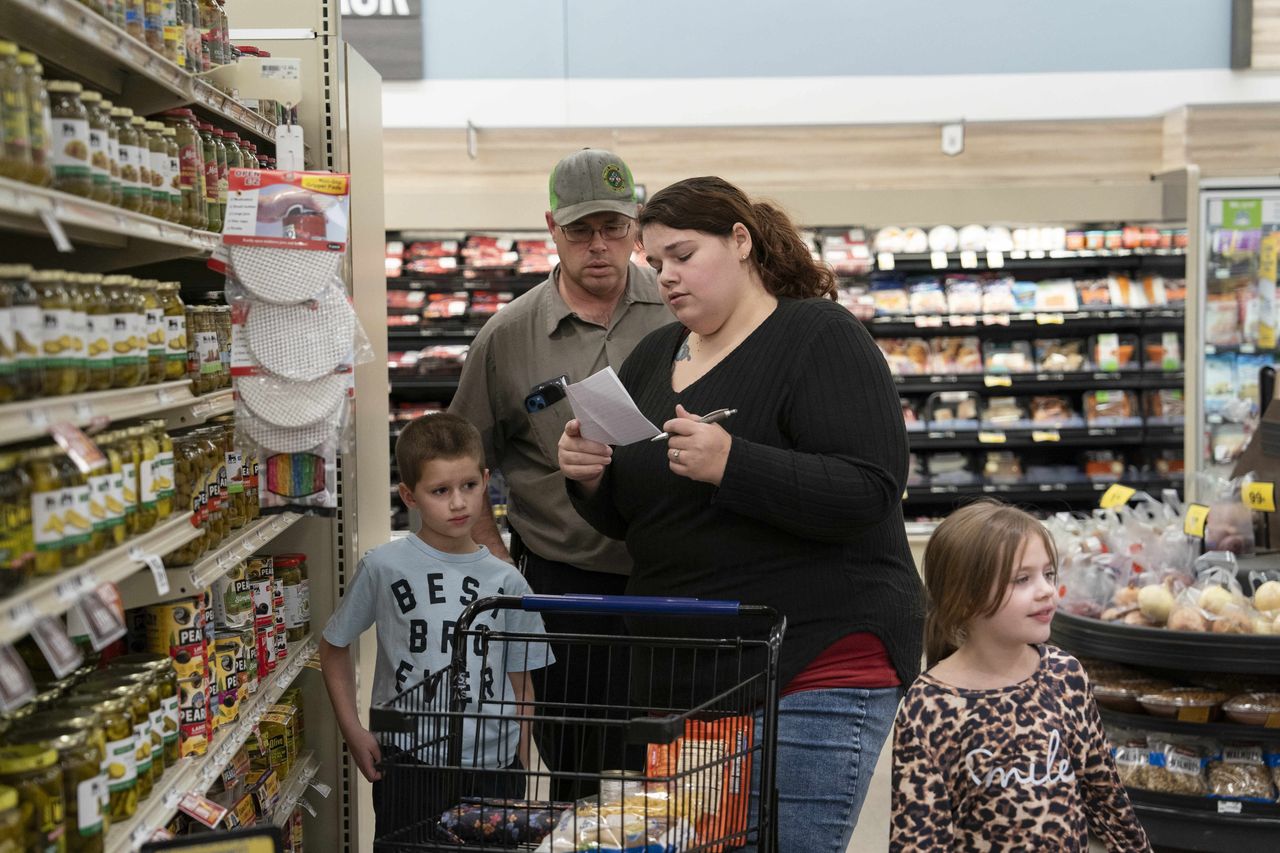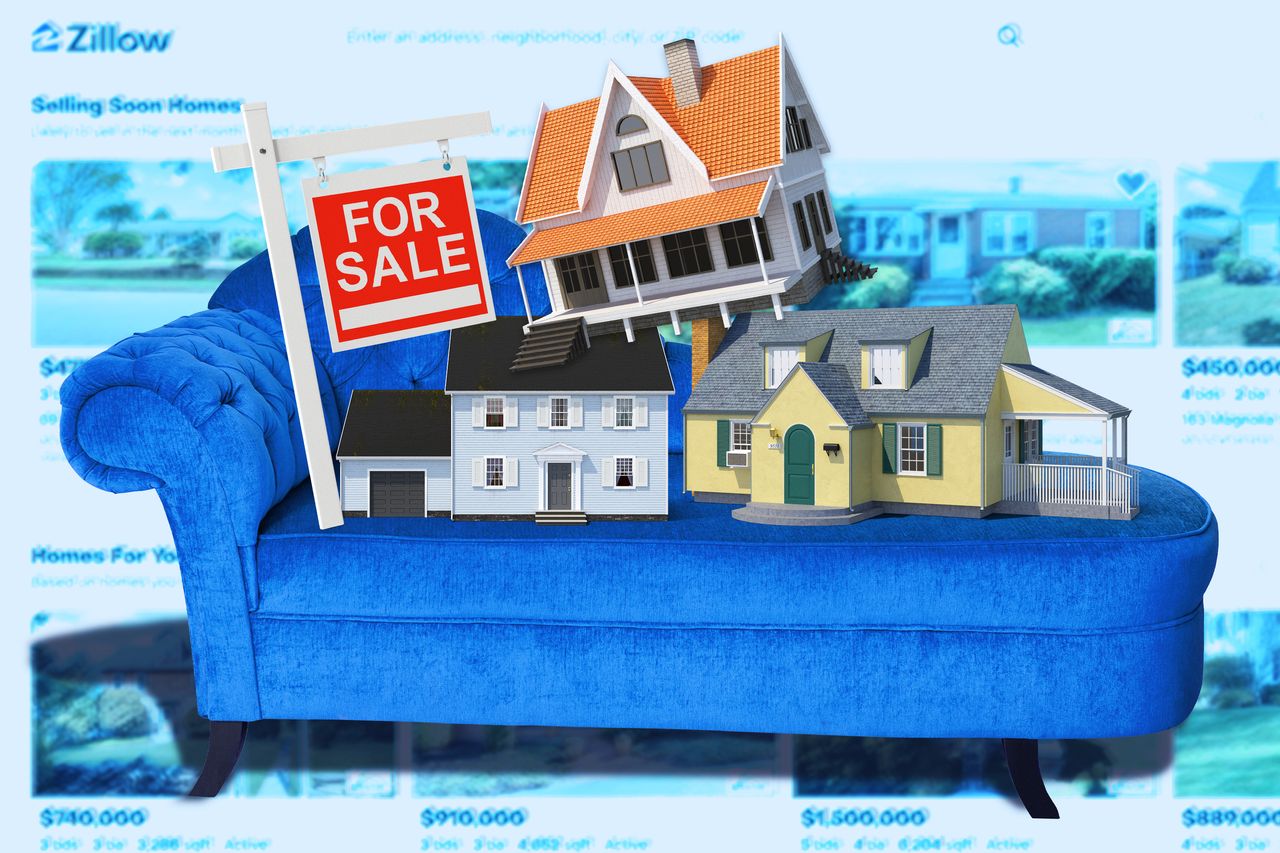Why Americans Are So Down on a Strong Economy
Clayton Wiles, a truck driver in North Carolina, earns about 20% more than three years ago. Kristine Funck, a nurse in Ohio, has won steady pay raises, built retirement savings and owns her home. Alfredo Arguello, who opened a restaurant outside Nashville when the pandemic hit, now owns a second one and employs close to 50 people. But ask any of them about the state of the American economy, and the same gloominess surfaces. “Unstable” is how Arguello describes it.
Said Funck: “Even though I’m OK right now, there’s a sense it could all go away in a second.”
There’s a striking disconnect between the widely shared pessimism among Americans and measures that show the economy is actually robust. Consumers are spending briskly —behaviour that suggests optimism, not retrenchment. Inflation has tempered . Unemployment has been below 4% for 24 straight months, the longest such stretch since the 1960s. The disconnect has puzzled economists, investors and business owners. But press Americans harder, and the immediate economy emerges as only one factor in the gloomy outlook.
Americans feel sour about the economy, many say, because their long-term financial security feels fragile and vulnerable to wide-ranging social and political threats. Reliable steps up the economic ladder, such as a college degree, no longer look like a good investment. War overseas, and an emboldened set of hostile nations, have made the world feel dangerous. Uninspiring leaders at home, running a government widely seen as dysfunctional, have left people without hope that America is up to the challenge of fixing its problems. The broad reasons for America’s dim outlook suggest that even further improvement in the economy might not be enough to lift the nation’s mood.
In an election year, that is shaping up as one of President Biden’s biggest impediments to winning a second term. He has received little credit so far for an economy that has foiled predictions of a recession and instead grew 3.1% in the past year, far ahead of the pace in 2022. By some metrics, that improvement is starting to give way to slightly rosier views of the economy. Consumer sentiment, as measured by the University of Michigan, recently posted the biggest two-month increase since 1991 . Yet it remains about 20% lower than during the robust economy of early 2020, just before the Covid-19 pandemic started, and it stands at about levels typically seen at the end of a recession rather than in an economy posting solid growth. Interviews with Americans across the country—some affluent, some just scraping by; some with advanced degrees and others with blue-collar jobs; some Republican, some Democrat—show they are weighed down by fears of an unpredictable world in which no one in government or business is competent to steer the nation through precarious times.
“You could argue unemployment is 3.7%, but who cares with this level of uncertainty?” said Arguello. “Because that’s what people are feeling. They’re not feeling hope. They’re not feeling one country. They’re feeling a divisive, divided United States of America.”
No ‘coherent plan’
Theresa Foster estimates her family’s net worth is up because the value of their home in suburban Albany, N.Y., has risen around 20% since the pandemic started.
“But every time I go to the store I am shocked by the prices,” said Foster, who earns more than $200,000 combined with her husband’s income. “I feel like we’re on really thin ice, that it’s really fragile, that neither political party has any theoretical foundation for what they want to do with the economy.”
Foster, 57, earned a master’s degree on GI Bill benefits and works part time at a nonprofit, while her husband works full time in human resources. To her, the notion that cooling inflation should ease her financial worries is akin to telling a person who is bleeding out that the flow of blood has slowed. What upsets her, she said, is that the government continues to spend money while racking up blunders, such as the botched withdrawal of U.S. forces from Afghanistan. None of that instills confidence in leaders’ ability to handle other complex issues.
“I feel like no matter what they tell me about the economy, they don’t really know, because they don’t have a coherent plan,” she said. The coming election has left her dispirited about the likely nominees, President Biden and Donald Trump , whom she calls “Loser 1 and Loser 2.” Foster voted libertarian in the last two presidential elections in protest and was registered independent until she recently registered as a Republican to vote against Trump in New York’s presidential primary in April. Funck, the nurse in Milford, Ohio, said she sees the country’s decline in the high number of uninsured and unhoused patients whom she cares for at a large Cincinnati medical centre. “
The politicians seem to be making out really good and then everybody else is struggling,” said Funck, who is 52 and an independent voter who backed Biden in 2020. She earns about $90,000 a year, had her student loans forgiven after two decades, and has no children to support. Still, she constantly fears she’ll be derailed by an unexpected expense, and worries that the wars in Gaza and Ukraine could push up the prices of oil and grain. After her mortgage and car payments, groceries and utility bills, there’s very little left over, she said. She’s prioritised saving for retirement “because I’m not expecting Social Security to be around, and I have to be able to support myself.”
Economic cracks
While many groups of Americans have made gains during the pandemic recovery, some cracks have emerged. Americans in lower-paying industries saw some of the strongest pay raises in recent years, but wage growth is now slowing overall, and more so for these workers . Research from the Federal Reserve Bank of Dallas found that low-income households disproportionately bear the brunt of inflation , in part because of the high share of their income that goes toward food, gas and rent. While inflation has cooled substantially from its peak in 2022, wage growth only began to outpace price increases in mid-2023 , meaning many Americans are still reeling from a long stretch in which it felt like their earnings couldn’t go far enough. The unemployment rate remains at near-record lows, but layoffs have hit some sectors of the economy with force, including technology and some other white-collar fields, such as accounting and media.
James Welch, a married father of two, moved his family from Atlanta to Plano, Texas, to take a job as a manager at an online fitness company after he was laid off early in the pandemic from a hotel company. Last July, he was laid off again. Welch, 49, said he’s depleted close to $450,000 in retirement and emergency savings in recent years to fund the move, medical expenses and costs for two children in college. His wife’s salary of roughly $72,000 annually as an operations manager is keeping the family afloat. Welch said he thinks he was the victim of cost-cutting moves at the company. He said shortly after he was laid off, he saw his job reposted for lower pay.
Mood mismatch
To many economists, the negative outlook doesn’t reflect the current economic life of most Americans.
“There’s some justification for some negativity about the economy, but nothing resembling the amount of negativity seen in some of the survey data,” said Jason Furman , a top economic adviser to President Barack Obama . Furman said that, historically, inflation and unemployment levels have been predictors of consumer sentiment, and that the recent spate of rising prices had unsettled consumers. “It’s just not a good enough reason for them to be as down on the economy as they say they are,” he said.
Many Americans point to structural changes in the economy that have left them anxious about the future. The decline of company pensions has shifted more of the risk of funding retirement from employers to workers. And many who once thought they could count on a college degree as a ticket into the middle class now question its value. Amy Bos, 44, a married mother of three in Jackson, Mich., said she wouldn’t necessarily recommend college for her 18-year-old daughter. Bos herself returned to college in her 30s to help her upgrade from a job as a pharmacy technician to higher-paying work in human resources, which roughly doubled her pay to $30 an hour. But she said she sacrificed immensely to pay off $41,000 in student loans, which she did only recently.
“A lot of people go to college and either don’t work in their degree field or get a lot of debt for a job that doesn’t have the ability to make very much money,” Bos said.
Some 78% of Americans said they aren’t confident their children’s lives will be better than their own, a Journal-NORC survey found last year. That’s a record in surveys dating to 1990. Only 36% said the American dream— the idea that anyone can get ahead with hard work —still holds true, down from 53% who had said so about a decade earlier, another Journal-NORC poll found. In Wilmington, N.C., the Wiles family feels like they’re sliding backward financially despite pay raises and frugal habits. Clayton, 44 years old, makes $10,000 more than he did three years ago in his job as a tow-truck driver, bringing the family’s annual income to $58,000. But the Wiles can’t afford to fix their broken-down truck and plan to draw from modest retirement savings to pay for health insurance for their two children when they lose Medicaid eligibility this year.
Haleigh, 30, is in school to become a teacher, but worries that even the addition of an extra salary won’t enable them to start saving for a down payment on a house. The combination of higher borrowing costs and higher home prices has made buying a home much less affordable. New 30-year fixed-rate mortgages, though down about a percentage point from last fall, are close to 7%, compared with under 3% three years ago. The increase in rates means a borrower typically has to pay hundreds of dollars more a month for a house that costs the same.
“I don’t think the American dream still exists,’’ said Haleigh. “I don’t think it’s attainable anymore. Because you need money to make money, and I think you either start out ahead or you’re constantly playing catch-up now.”
Political skew
One factor in the downbeat outlook is that many Americans view the economy through a political lens. Their opinion is more optimistic when the party of their choice holds the White House. In the weeks before the 2016 election, only 11% of Republicans rated the economy as excellent or good, CNBC polling found. That jumped to 26% right after the election, even before Donald Trump was sworn in as president, and rose to 73% within a year. By contrast, Democratic views of the economy turned more negative over the same period.
Some analysts find signs that the partisan skew in views of the economy is particularly powerful now, with Biden in the White House, because Republicans are more likely than Democrats to adopt a negative view when their party is out of power.
“We find that Republicans cheer louder when their party is in control and boo louder when their party is out of control,’’ wrote Stanford University economics professor Neale Mahoney, who held White House positions under Biden and Obama, and Ryan Cummings, a Ph.D. student, in a November Substack posting. By statistically “adjusting the decibel level’’ so that the two parties cheer equally, they found that about 30% of the gap between consumer sentiment and what would be predicted by the economic data could be explained by what they called “asymmetric amplification” of consumer sentiment according to a person’s political party.
In a complementary study, two Brookings Institution analysts found that news about the economy reported in legacy news media—big-city papers such as the Atlanta Journal-Constitution, the Washington Post and The Wall Street Journal—has been more negative than what would be predicted by actual measures of the economy. The San Francisco Fed’s index of daily news sentiment, which measures the positive or negative outlook of economic stories in news publications, had correlated well for several decades with measures of unemployment, gross domestic product, inflation and stock prices, according to research by Ben Harris, who was the top economist in the Biden administration’s Treasury Department, and Aaron Sojourner.
But in 2018, news sentiment turned more negative than the economic fundamentals, and the negativity gap has widened during the Biden administration. The study didn’t include broadcast media, such as Fox News or MSNBC, that are widely seen as tilted toward one party or the other. Nor did it prove that negative news caused lower consumer sentiment. Michael Strain , director of economic policy studies at the right-leaning American Enterprise Institute, said that the economy as people experience it in their daily lives explains most of the disconnect. While he sees some mismatch between sentiment and economic fundamentals, he believes that the corrosive impact of inflation accounts for much of it given its broad reach and because people became accustomed to very small price increases in recent years.
“When people say they don’t feel good about the economy, we should believe them,” Strain said.
‘Dark clouds’
Arguello, the Nashville-area restaurant owner, got into the food-service industry in May 2020, early in the pandemic. After ending a 30-year career at General Electric , where he was most recently a senior executive, the 65-year-old decided to buy and operate a burger franchise with his son, a recent college graduate, as a way to teach him how to run a business while deepening his own roots in his community after years of travel.
The Mooyah burger franchise they opened was successful enough that they opened a second location. Fourth-quarter revenues in 2023 were 15% higher than in the prior year, Arguello said. Despite his personal success, Arguello said he believes that “the light at the end of the tunnel is not there yet” for a nation emerging from the pandemic and its high-inflation trauma. Many other nearby restaurants have recently closed, he said, and more broadly, he’s concerned that America is suffering because political leaders are putting their party’s needs above the country’s.
“You have this political instability, a world that is very unstable, with this economic uncertainty,’’ said Arguello, who is originally from Nicaragua. He considers himself right-of-centre politically and would vote reluctantly for Trump this year if he is the GOP nominee. “What people are sensing is not whether the inflation is becoming moderate,” he said. “It’s that the dark clouds remain.”
 Copyright 2020, Dow Jones & Company, Inc. All Rights Reserved Worldwide. LEARN MORE
Copyright 2020, Dow Jones & Company, Inc. All Rights Reserved Worldwide. LEARN MORE
This stylish family home combines a classic palette and finishes with a flexible floorplan
Just 55 minutes from Sydney, make this your creative getaway located in the majestic Hawkesbury region.
As Paris makes its final preparations for the Olympic games, its residents are busy with their own—packing their suitcases, confirming their reservations, and getting out of town.
Worried about the hordes of crowds and overall chaos the Olympics could bring, Parisians are fleeing the city in droves and inundating resort cities around the country. Hotels and holiday rentals in some of France’s most popular vacation destinations—from the French Riviera in the south to the beaches of Normandy in the north—say they are expecting massive crowds this year in advance of the Olympics. The games will run from July 26-Aug. 1.
“It’s already a major holiday season for us, and beyond that, we have the Olympics,” says Stéphane Personeni, general manager of the Lily of the Valley hotel in Saint Tropez. “People began booking early this year.”
Personeni’s hotel typically has no issues filling its rooms each summer—by May of each year, the luxury hotel typically finds itself completely booked out for the months of July and August. But this year, the 53-room hotel began filling up for summer reservations in February.
“We told our regular guests that everything—hotels, apartments, villas—are going to be hard to find this summer,” Personeni says. His neighbours around Saint Tropez say they’re similarly booked up.
As of March, the online marketplace Gens de Confiance (“Trusted People”), saw a 50% increase in reservations from Parisians seeking vacation rentals outside the capital during the Olympics.
Already, August is a popular vacation time for the French. With a minimum of five weeks of vacation mandated by law, many decide to take the entire month off, renting out villas in beachside destinations for longer periods.
But beyond the typical August travel, the Olympics are having a real impact, says Bertille Marchal, a spokesperson for Gens de Confiance.
“We’ve seen nearly three times more reservations for the dates of the Olympics than the following two weeks,” Marchal says. “The increase is definitely linked to the Olympic Games.”

Getty Images
According to the site, the most sought-out vacation destinations are Morbihan and Loire-Atlantique, a seaside region in the northwest; le Var, a coastal area within the southeast of France along the Côte d’Azur; and the island of Corsica in the Mediterranean.
Meanwhile, the Olympics haven’t necessarily been a boon to foreign tourism in the country. Many tourists who might have otherwise come to France are avoiding it this year in favour of other European capitals. In Paris, demand for stays at high-end hotels has collapsed, with bookings down 50% in July compared to last year, according to UMIH Prestige, which represents hotels charging at least €800 ($865) a night for rooms.
Earlier this year, high-end restaurants and concierges said the Olympics might even be an opportunity to score a hard-get-seat at the city’s fine dining.
In the Occitanie region in southwest France, the overall number of reservations this summer hasn’t changed much from last year, says Vincent Gare, president of the regional tourism committee there.
“But looking further at the numbers, we do see an increase in the clientele coming from the Paris region,” Gare told Le Figaro, noting that the increase in reservations has fallen directly on the dates of the Olympic games.
Michel Barré, a retiree living in Paris’s Le Marais neighbourhood, is one of those opting for the beach rather than the opening ceremony. In January, he booked a stay in Normandy for two weeks.
“Even though it’s a major European capital, Paris is still a small city—it’s a massive effort to host all of these events,” Barré says. “The Olympics are going to be a mess.”
More than anything, he just wants some calm after an event-filled summer in Paris, which just before the Olympics experienced the drama of a snap election called by Macron.
“It’s been a hectic summer here,” he says.

AFP via Getty Images
Parisians—Barré included—feel that the city, by over-catering to its tourists, is driving out many residents.
Parts of the Seine—usually one of the most popular summertime hangout spots —have been closed off for weeks as the city installs bleachers and Olympics signage. In certain neighbourhoods, residents will need to scan a QR code with police to access their own apartments. And from the Olympics to Sept. 8, Paris is nearly doubling the price of transit tickets from €2.15 to €4 per ride.
The city’s clear willingness to capitalise on its tourists has motivated some residents to do the same. In March, the number of active Airbnb listings in Paris reached an all-time high as hosts rushed to list their apartments. Listings grew 40% from the same time last year, according to the company.
With their regular clients taking off, Parisian restaurants and merchants are complaining that business is down.
“Are there any Parisians left in Paris?” Alaine Fontaine, president of the restaurant industry association, told the radio station Franceinfo on Sunday. “For the last three weeks, there haven’t been any here.”
Still, for all the talk of those leaving, there are plenty who have decided to stick around.
Jay Swanson, an American expat and YouTuber, can’t imagine leaving during the Olympics—he secured his tickets to see ping pong and volleyball last year. He’s also less concerned about the crowds and road closures than others, having just put together a series of videos explaining how to navigate Paris during the games.
“It’s been 100 years since the Games came to Paris; when else will we get a chance to host the world like this?” Swanson says. “So many Parisians are leaving and tourism is down, so not only will it be quiet but the only people left will be here for a party.”
This stylish family home combines a classic palette and finishes with a flexible floorplan
Just 55 minutes from Sydney, make this your creative getaway located in the majestic Hawkesbury region.






















